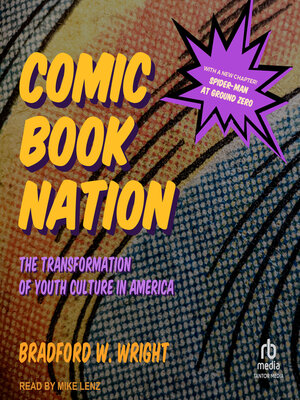Comic Book Nation
audiobook (Unabridged) ∣ The Transformation of Youth Culture in America
By Bradford W. Wright

Sign up to save your library
With an OverDrive account, you can save your favorite libraries for at-a-glance information about availability. Find out more about OverDrive accounts.
Find this title in Libby, the library reading app by OverDrive.



Search for a digital library with this title
Title found at these libraries:
| Library Name | Distance |
|---|---|
| Loading... |
As American as jazz or rock and roll, comic books have been central in the nation's popular culture since Superman's 1938 debut in Action Comics #1. In Comic Book Nation, Bradford W. Wright offers an engaging, illuminating, and often provocative history of the comic book industry within the context of twentieth-century American society.
From Batman's Depression-era battles against corrupt local politicians and Captain America's one-man war against Nazi Germany to Iron Man's Cold War exploits in Vietnam and Spider-Man's confrontations with student protestors and drug use in the early 1970s, comic books have continually reflected the national mood, as Wright's imaginative reading of thousands of titles makes clear. In every genre Wright finds that writers and illustrators used the medium to address a variety of serious issues.
Wright's lively study also focuses on the role comic books played in transforming children and adolescents into consumers; the efforts of parents, politicians, religious organizations, civic groups, and child psychologists to link juvenile delinquency to comic books and impose censorship; and the changing economics of comic book publishing over the course of the century. Comic Book Nation is at once a serious study of popular culture and an entertaining look at an enduring American art form.
From Batman's Depression-era battles against corrupt local politicians and Captain America's one-man war against Nazi Germany to Iron Man's Cold War exploits in Vietnam and Spider-Man's confrontations with student protestors and drug use in the early 1970s, comic books have continually reflected the national mood, as Wright's imaginative reading of thousands of titles makes clear. In every genre Wright finds that writers and illustrators used the medium to address a variety of serious issues.
Wright's lively study also focuses on the role comic books played in transforming children and adolescents into consumers; the efforts of parents, politicians, religious organizations, civic groups, and child psychologists to link juvenile delinquency to comic books and impose censorship; and the changing economics of comic book publishing over the course of the century. Comic Book Nation is at once a serious study of popular culture and an entertaining look at an enduring American art form.







